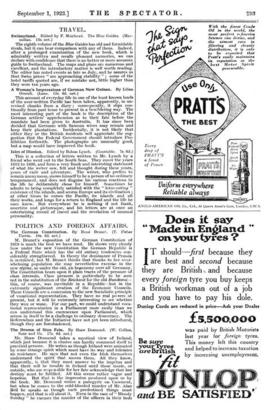POLITICS AND FOREIGN AFFAIRS.
The German Constitution. By Rend Brimet. (T. Fisher Unwin. 10s. 6d. net.)
M. Brunet's exposition of the German Constitution of 1919 is much the best we have read. He shows very clearly how under the new Constitution the German Republic is a Federal State which has the old unitary tendencies con- siderably strengthened. In theory the dominance of Prussia is restricted, but M. Brunet thinks that thanks to her over- whelming population she may nevertheless exercise in the new regime, as under the old, an hegemony over all Germany. The Constitution bears upon it plain traces of the pressure of class interests. Class pressure is particularly to be seen not in the substitution of the Reichsrat for the old Bundesrat- this, of course, was inevitable in a Republic—but in the extremely significant creation of the Economic Councils. These Councils are a concession to the new Socialistic principle of vocational representation. They have no real powers at present, but it will be extremely interesting to see whether they wax or wane. For our part, we could understand voca- tional representation in a Parliament more easily than we can understand this excrescence upon Parliament, which seems in itself to be a challenge to ordinary democracy. The Referendum and the Initiative have not yet been introduced, though they are foreshadowed.


































 Previous page
Previous page